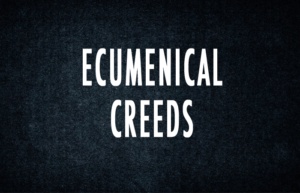The word ecumenical means universal and the ecumenical creeds are the church’s articulation of the universal (or, in that same sense) catholic faith taught in Holy Scripture and confessed by the church since the time of the apostles. The apostolic church itself . . . Continue reading →
Heidelcast 190: What Must A Christian Believe? (8): “And I Believe In Jesus Christ, His Only Begotten Son, Our Lord”
This is episode 8 in the series, What Must A Christian Believe? In this episode we are considering the third article of the Apostles’ Creed: “And I believe in Jesus Christ, his only begotten Son, our Lord, our Lord.” With this article . . . Continue reading →











